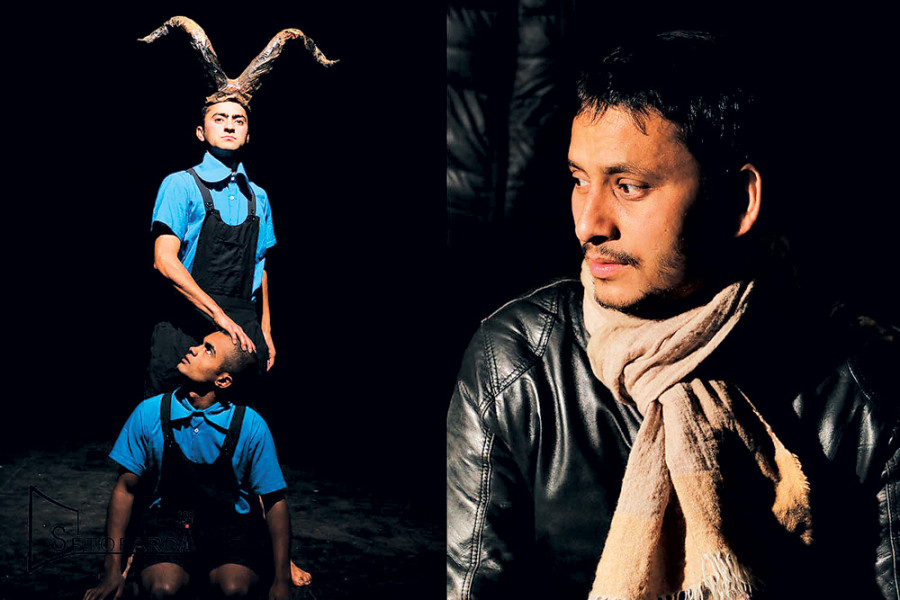Miscellaneous
Nepali pastoral
In Khagendra Lamichhane’s play Dant ko Dob, Nepal’s rustic reality—and its socio-economic dynamics—takes centre stage
Timothy Aryal
Anything by Khagendra Lamichhane, as is evident from the films, plays and stories he has put out, is imbued with a quintessential touch of Nepali realities. Pashupati Prasad, the film Khagendra starred in and wrote the script for, told the story of the struggle of a naive boy, bruised and burnt in the harsh Kathmandu city. His debut anthology of short stories, Fulani, recants stories of the various cross-sections of Nepali society. In the same vein, Lamichhane’s play Dant ko Dob, which is currently being staged at the Mandala Theatre in the Capital, is a story of a childhood friendship, set in a rural Nepali village.
Like many artists, Lamichhane derives his subject matter from his childhood—from his roots. Lamichhane grew up in a village in Western Nepal and in Dant ko Dob, Lamichhane’s source is a simple story from his village—a reality he confronted time and again while growing up.
The play evokes the rustic Nepali lifestyle at its most basic: the mundane village life and the myriad ways the characters employ to seek escape from the world as it is. The narrative involves a small flock of kids and the little tricks and games they play with, and against, each other.
Life in a village is one big adventure. For kids, it is all the more adventurous with games like Gatti, Guchcha and Kabaddi, chasing after oranges and ainselus, and accompanied by friends all along. Indeed, if it had not been for the presence of friends, these adventures would have lost their magic. And this adventure, in a nutshell, is the play Dant ko Dob.
The play tells a simple story of a friendship that lies lurking beneath the surface of enmity. The two characters, Loknath (played by Anoj Pandey) and Hariprasad (played by Prakash Dahal), go through a series of feuds and reconciliations.
The story is told by an adult Loknath, who recounts an incident that occurred during his childhood.Loknath is a bully, who time and again tries to influence his power, failing at times, over his friends. He gets his way with other friends but Hariprasad is not someone who easily gives up. Hariprasad is strong and can easily overpower Lokknath. Loknath then cooks up a conspiracy against Hariprasad, asking Jhakku, a strongly-built boy, to exact revenge. Then one day, during their usual fights, Loknath bites Hariprasad’s hand, leaving a mark of his teeth.
Amid this feud and friendship, Hariprasad one day gets lost. Later, we are told that he has gone to India. He then gets sick and in a telling moment Loknath finds himself compelled to visit Hariprasad to wish him good health and seek reconciliation. They become good friends, but not for long. The play draws to a close in a heartrending scene of friendship and loss. There are some autobiographical resonances of director Lamichhane’s past which gives the play a personal touch. But the play is more than just a simple tale of friendship. The play brings forth the socio-economic dynamics of the time it is set in. We are given some hints about the time period where the play is set in—the characters sing a song from Darpan Chhaya, a film which came out back in 2001. The play revisits the time and examines the societal discrimination still rife in Nepali society. Hariprasad is a Damai boy, and in more than a few scenes he is ostracised and bullied by his friends. The mystique of the play lies not in the denouement but in the journey. With expertly-conceived dialogue sequences and with costumes to match, the play never loses its charm. The director has reached deep beneath the psyche of characters—the characters seem to be exaggerating without making the viewer feel they are exaggerating. They seem very real.
In one scene during the final moments of the play, Hariprasad murmurs to his arch friend and enemy, Loknath, something along these lines: “While I was away in India, even though you were far from me, the mark of your teeth always remained with me. I would look at it and remember you.”And that’s what leaves the mark in the audience’s mind as well.
So here’s an exciting play that stands as a testament to Lamichhane’s ability to create something out of what he sees—the quintessential reality of rural Nepalis.




 13.12°C Kathmandu
13.12°C Kathmandu










